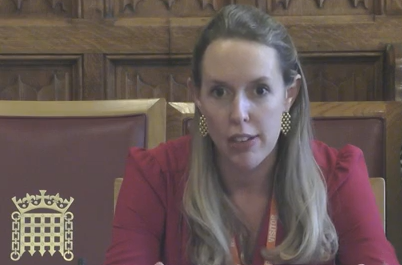At a hearing of the Lords’ home-based working committee, Philippa O’Connor, chief people officer at PwC said the firm adopted a formal hybrid policy in January, moving from two to three days in the office. It has now started to analyse the first quarter’s data from the staff monitoring programme.
‘We have a formal three days a week. We genuinely believe it is best for our clients, better for innovation. We are a training programme at our heart and we’re very clear that the ability to do that training is absolutely critical for them to be together in person for the majority, but not for all of their week.’
The staff monitoring started in January and is measured on a three-month rolling average.
‘It is early days for trends – the first is the connection with utilisation, the correlation between people being in the office and being more collaborative,’ said O’Connor.
‘The other thing is about engagement, the initial data shows that where we have people in the office they are more engaged, but you have to be careful as when we had people in our office five days a week they were less engaged. We need to keep adapting and learning as we go.’
‘I think really importantly from when we introduced this policy we have been as clear as we possibly can be that that does not take away from giving our employees empowered flexibility.’
O’Connor was questioned by the committee, chaired by Baroness Scott of Needham Market, about how the firm monitored staff.
‘We believe that the balance is right at the moment. In terms of monitoring, we are looking at whether people should have been at work. We do time sheets, one is them tapping into our offices, we are not clocking people in and out, where they have logged into our IP, and finally, we have a form,’ said O’Connor.
‘The point of that form is that where they need to adjust their data, as they are at a client office, at a work office abroad, or could not be in the office, for example, say a carer with a neuro divergent child.
‘We do trust our people, nothing beyond that is required at this time.’
Lord Fuller was interested about the balance of enforcement, asking ‘How heavy handed can disciplinary processes be? Do people get less bonus, has anyone been dismissed?’
O’Connor explained the PwC position. ‘Until we’ve had monitoring we could not do anything, in terms of the approach now we have the career coach speak to each of them to see what is going on underneath the bonnet. As with any other employment policy on disciplinary attendance we need to deliver with the fairness agenda. There is a very careful balance for us to strike here.’
Results, productivity and servicing clients was critical to PwC’s approach to office working.
‘We thought incredibly carefully about this policy and this allows us to hit the right balance. We truly believe with a flexible empowered workforce we do drive better outcomes,’ said O’Connor.
The Lords committee also heard from Lindsay Pattison, chief people officer at global advertising giant and marketing services agency WPP, which has also implemented a return to work policy with staff required to work in the UK offices four days a week from April 2024.
Pattison told the committee that the advertising agency has faced pushback from recruitment firms due to the office working policy, but said it was absolutely committed to the approach and would certainly not be changing it.
‘We have had to make adjustments, we have had lots of noise about our recruitment partners. They say our policy is very rigid, but it is not very rigid. Many of our clients are back five days a week, they may be working in factories, nurses and doctors.’
In terms of the benefits of in-office working, Pattison said ‘we realised that confusing being on a Zoom call or on a tiny box [on Teams] speaking to other people was different to real discussion and collaboration’.
‘On a Friday it all started to decline,’ she added. ‘We are broadly a time-based industry – we charge our clients by the hour, and we need our people to work their hours so we can deliver for our clients.’
Office redesign has been a critical part of WPP’s approach with campuses and renovated buildings, but productivity and maximising revenue is clearly an important factor in the decision to go to four-day office weeks.
‘Productivity is based on net sales – being together we can create better and more creative ideas,’ said Pattison.
‘We’re not tracking, we don’t have the systems to track on a minute basis. We get our managers to monitor, agree core days… we are not at an individual level doing a scorecard on each person, we believe that is a step too far for us,’ she added.
Baroness Manzoor questioned the witnesses about office etiquette, which WPP admitted had been a problem when staff were first required to return to the office and some were not used to working in such an environment.
‘There is a real piece around etiquette, how you make that work around your office, and there is the issue of purpose – we have taken this into account with our renovations of our offices. Use of space is very important,’ said Pattison.
Also at the hearing was Dr Samir Attia, CEO and chair of logistics firm SMA Worldwide, which requires in-office working with ‘purpose driven attendance’. ‘Our goal was to make coming to the office purposeful…although we are not anti flexibility, we are pro our clients. Now our clients demand face to face,’ he said.









